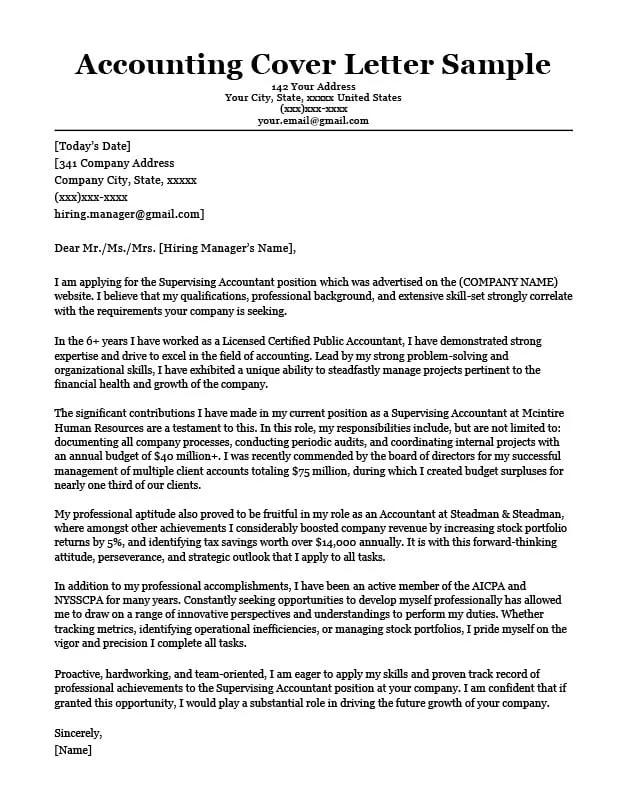In the competitive world of accounting, a well-crafted cover letter is your secret weapon. It’s your chance to go beyond your resume and demonstrate why you’re the perfect candidate for the job. This guide will walk you through the essential elements of an impressive accounting cover letter, ensuring you stand out from the competition and land your dream role. A compelling cover letter is not just a formality; it’s a powerful tool that can significantly increase your chances of getting an interview. It allows you to showcase your personality, highlight your relevant skills, and demonstrate your genuine interest in the position and the company. Don’t underestimate the impact a strong cover letter can have on your job search.
Why an Accounting Cover Letter is Crucial
While your resume provides a snapshot of your qualifications, your cover letter offers a platform to tell your story and connect with the hiring manager on a personal level. It allows you to expand on your skills, explain any gaps in your employment history, and express your enthusiasm for the opportunity. A cover letter is your chance to demonstrate your writing skills, attention to detail, and understanding of the specific requirements of the job. It shows that you’ve taken the time to research the company and tailor your application to their needs. Without a cover letter, you risk appearing generic and failing to make a strong first impression. A cover letter offers context to your application and reveals aspects of your personality and work style that a resume alone cannot convey.
Key Elements of a Winning Accounting Cover Letter
A successful accounting cover letter includes several key elements that work together to create a compelling narrative. Each section plays a vital role in conveying your qualifications, showcasing your personality, and demonstrating your interest in the position. Let’s explore the essential components of a winning cover letter: contact information, a professional salutation, a captivating opening, a focused body highlighting your skills and achievements, and a strong closing with a call to action. Remember to always tailor your letter to each specific job application. Use the company’s name, demonstrate knowledge of the position, and showcase how your skills meet the requirements of the role.
Your Contact Information and Date
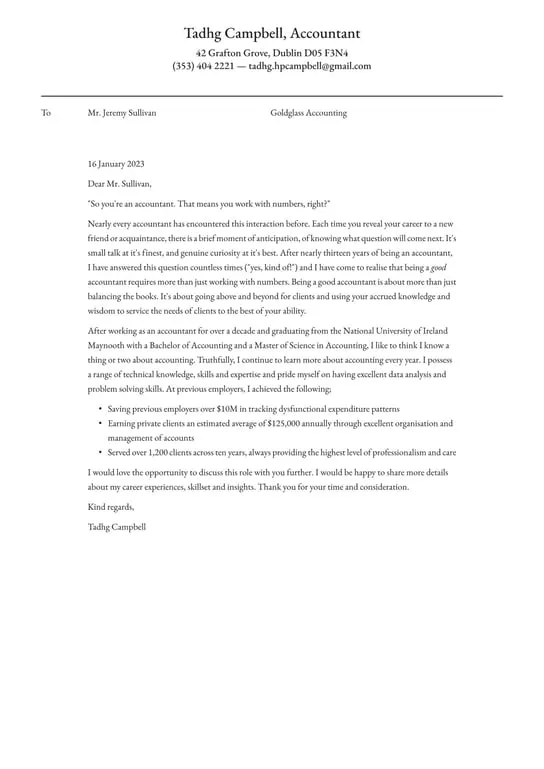
Begin your cover letter by providing your full name, address, phone number, and professional email address at the top. Ensure the information is accurate and up-to-date. Include the date below your contact information. This section sets a professional tone and allows the hiring manager to easily reach you. Double-check all details for accuracy to avoid any communication issues. Choose a professional email address (e.g., firstname.lastname@email.com) instead of a casual one. This attention to detail showcases your professionalism and attention to detail, both crucial for accounting roles. The date is important for record-keeping and demonstrates when you submitted your application. Maintain a consistent format throughout your application materials.
Addressing the Hiring Manager
Address your cover letter to a specific person whenever possible. Research the hiring manager’s name and title through the company website, LinkedIn, or the job posting itself. A personalized greeting shows initiative and attention to detail. If you can’t find a specific name, use a professional salutation like “Dear Hiring Manager.” Avoid generic greetings such as “To Whom It May Concern.” Personalizing your greeting demonstrates your interest in the company and the role, making a positive first impression. Using the hiring manager’s name, if available, immediately establishes a more personal connection. It shows you have taken the time to research and understand the company’s organizational structure. If you cannot find a name, using a generic title like “Dear Hiring Manager” is still acceptable.
Opening Paragraph: Grab Their Attention
The opening paragraph is your first opportunity to make a strong impression. Start with a concise statement that grabs the reader’s attention and clearly states your interest in the position. Mention where you found the job posting. Briefly highlight your most relevant qualification or a key achievement. Show your enthusiasm for the role and the company. Avoid generic opening lines and instead, tailor your opening to the specific job and company. Use a compelling hook, such as a brief story or a key accomplishment, to immediately engage the reader. Clearly state the position you are applying for, and indicate why you are a strong fit for the role. State your interest in the company and demonstrate that you understand the business. Focus on the job requirements and connect them with your skills.
Highlighting Your Accounting Skills and Experience
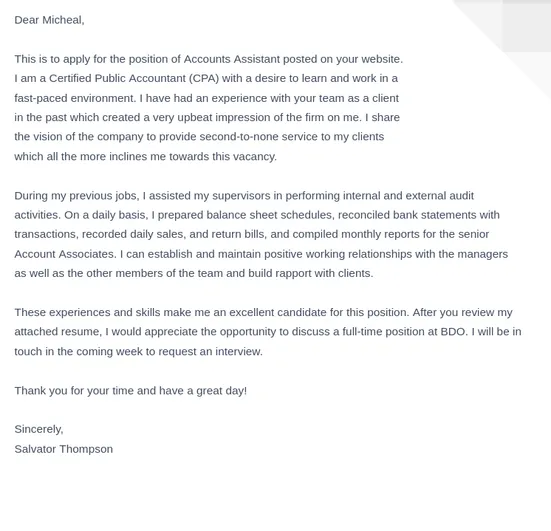
The body of your cover letter is where you showcase your accounting skills and experience. Provide specific examples of how you’ve utilized your skills in previous roles. Mention relevant software, such as QuickBooks, SAP, or others. Explain your proficiency in areas like financial reporting, budgeting, and auditing. Use action verbs to describe your accomplishments. Tailor this section to match the requirements outlined in the job description. This demonstrates your ability to excel in the role. Show how your skills translate into tangible results, such as improved efficiency or cost savings. Provide quantifiable achievements to further emphasize your abilities and accomplishments. Use keywords from the job description to highlight your qualifications and demonstrate that you meet the criteria.
Quantify Your Achievements in Accounting
Numbers speak louder than words. Whenever possible, quantify your achievements with specific data and metrics. This provides tangible evidence of your success. For example, mention the percentage by which you reduced expenses, the number of accounts you managed, or the amount of money you saved the company. Use data to demonstrate the impact of your contributions to previous roles. Quantifiable achievements add credibility to your claims and make your application more compelling. Avoid vague statements and instead, use specific numbers to demonstrate your impact. Highlight your achievements using specific data to showcase your capabilities and contributions in previous roles. Providing this data further strengthens your claims and showcases your ability to deliver results.
Demonstrating Your Understanding of the Company
Demonstrate that you understand the company’s mission, values, and industry. Research the company and mention specific projects or initiatives that resonate with you. Explain how your skills and experience align with the company’s goals and objectives. This shows you’ve taken the time to learn about the organization and are genuinely interested in joining their team. Tailor your cover letter to match the company’s culture and values. Mention specific products or services that you find interesting or admirable. Refer to recent news or developments related to the company to show that you are informed. Demonstrate your knowledge of the company and show the hiring manager that you are not just sending out generic applications.
Showcasing Your Personality and Enthusiasm
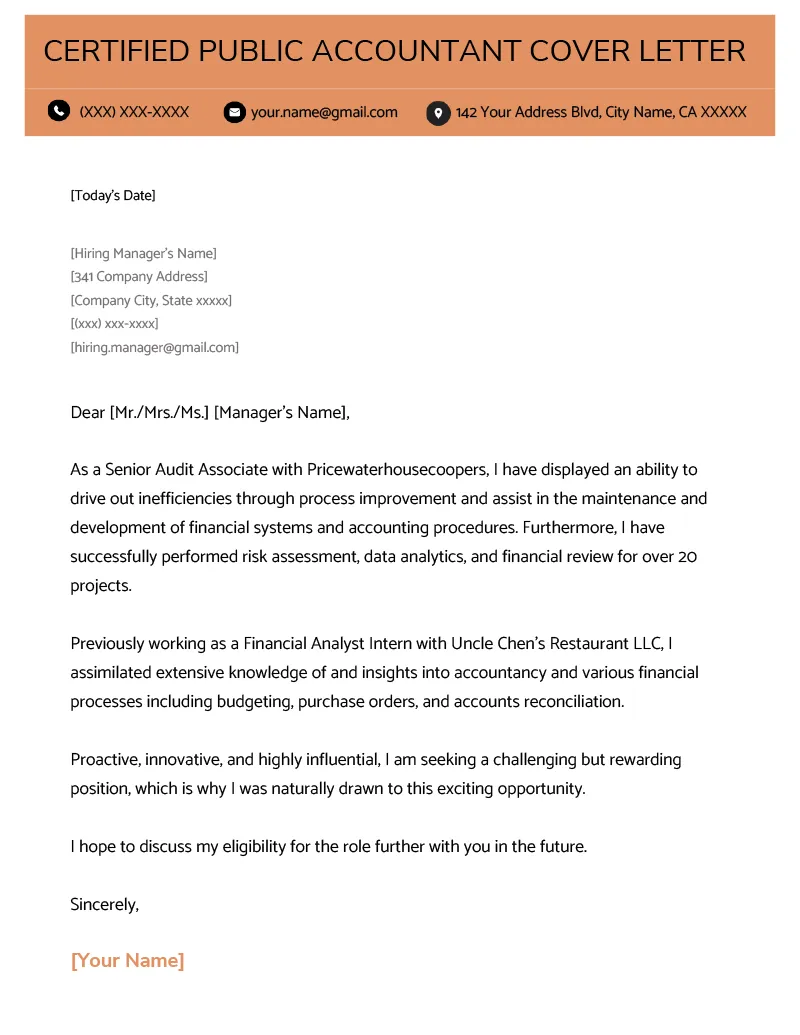
While maintaining professionalism, let your personality shine through. Show your enthusiasm for the role and the company. Use a positive and confident tone throughout your cover letter. Highlight your soft skills, such as teamwork, communication, and problem-solving abilities. Share your passion for accounting and explain why you are excited about the opportunity. Your personality and enthusiasm are important in showcasing your fit for the role. Your cover letter is a chance to express your personality, showing that you’re not just a qualified candidate, but also a great fit for the company culture. This is especially important in the accounting world, where teamwork and good communication are very important. Show your enthusiasm, personality, and interest in the opportunity to set yourself apart from the competition.
Closing Paragraph and Call to Action
In your closing paragraph, reiterate your interest in the position and summarize your key qualifications. Thank the hiring manager for their time and consideration. Include a call to action, such as stating that you are available for an interview and look forward to hearing from them soon. Make it clear that you are enthusiastic and ready to discuss the role further. Express your enthusiasm and your availability for an interview in your closing. A strong call to action encourages the hiring manager to move forward with your application. Ensure your closing paragraph leaves a positive lasting impression. Provide a clear call to action, for example, by suggesting a follow-up call.
Proofreading and Formatting Your Cover Letter
Proofreading your cover letter is crucial. Carefully review your cover letter for any grammatical errors, spelling mistakes, or typos. Ask someone else to proofread it as well, as a second pair of eyes can catch errors you might miss. Use a professional and easy-to-read font, such as Arial or Times New Roman. Maintain consistent formatting throughout your document. Ensure proper spacing and alignment. A well-formatted cover letter demonstrates your attention to detail. Always proofread, proofread, and proofread again. Make sure there are no spelling or grammar errors to ensure a polished presentation. Proofreading is essential to convey professionalism and competence to the hiring manager. This demonstrates your attention to detail and will help the hiring manager take you seriously.
Common Mistakes to Avoid in Your Accounting Cover Letter
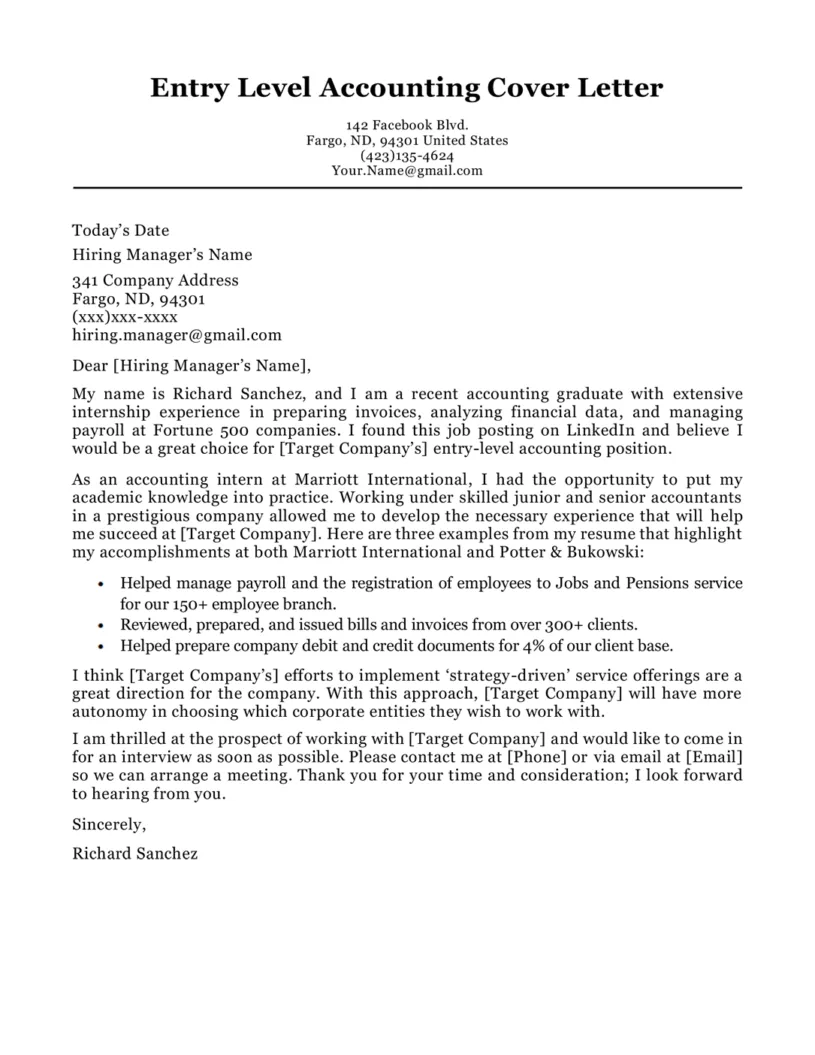
Avoid generic cover letters. Always tailor your letter to the specific job and company. Don’t simply rehash your resume. Use your cover letter to elaborate on your skills and achievements. Avoid using overly formal language. Write in a clear and concise manner. Never include negative information about your previous employers or colleagues. Don’t make any spelling or grammatical errors. Avoid using jargon or technical terms that the hiring manager might not understand. Do not exceed one page. Keep your cover letter concise and focused on the most relevant information. Ensure it is easy to read and highlights your best qualifications. These common mistakes can hurt your chances of getting an interview. By avoiding them, you can create a cover letter that impresses the hiring manager.
Tailoring Your Cover Letter for Specific Accounting Roles
Adapt your cover letter to each specific accounting role you apply for. Carefully review the job description and highlight the skills and experiences that are most relevant to the position. Use keywords from the job description to demonstrate that you meet the required qualifications. Tailor the tone and content of your cover letter to match the company’s culture and values. Research the company and industry to demonstrate your understanding of the role. Be specific and provide examples of your achievements related to the job requirements. This approach will increase your chances of getting noticed and making a strong impression. Customizing your cover letter for each role ensures that you are presenting yourself as the best candidate for the specific job. It will also showcase your attention to detail, which is highly valued in accounting.
